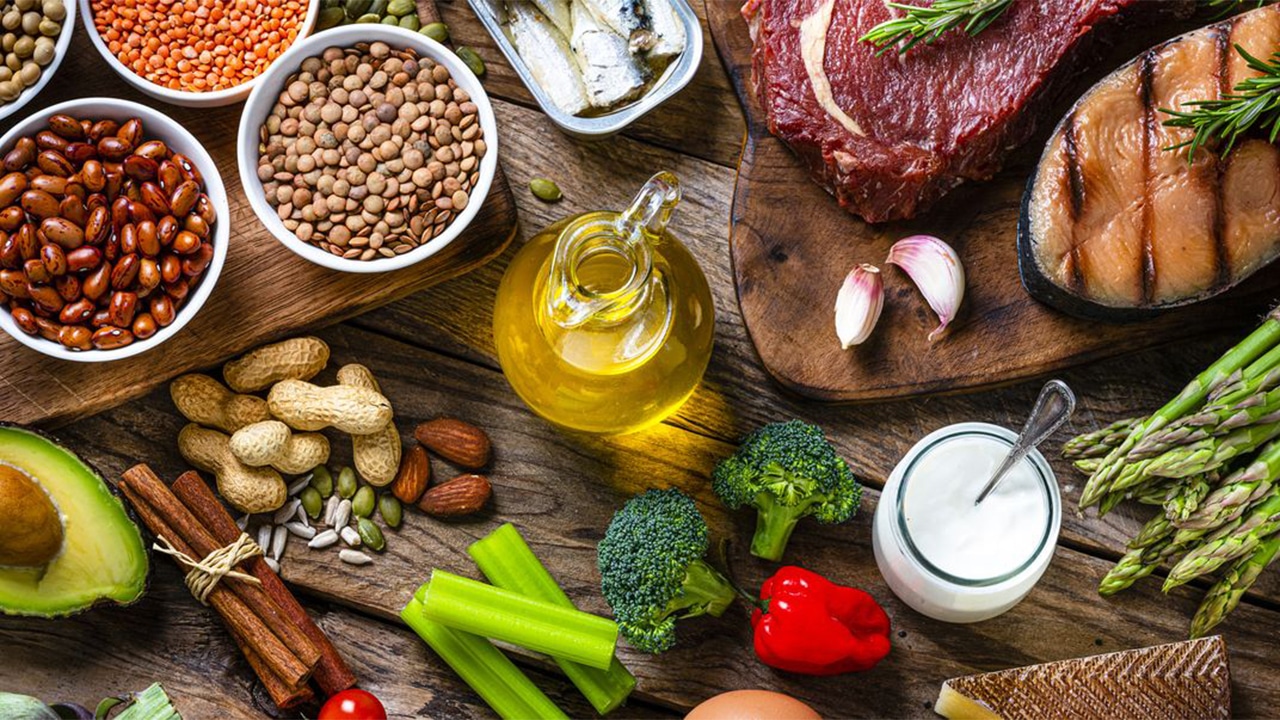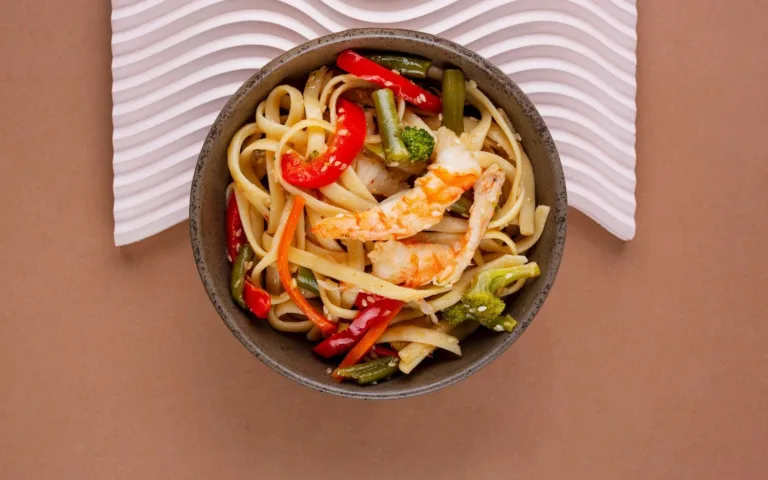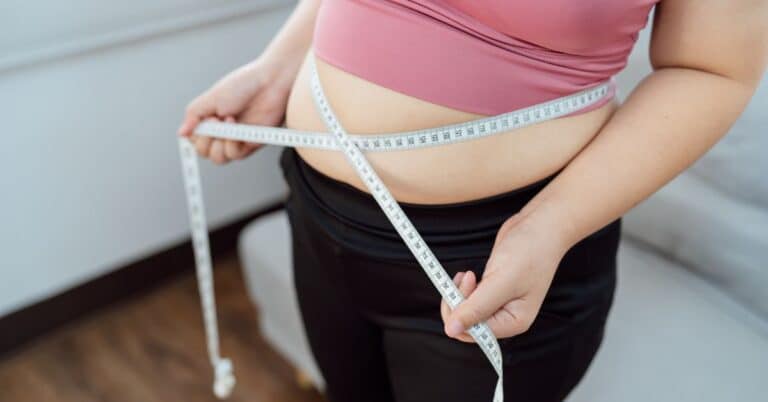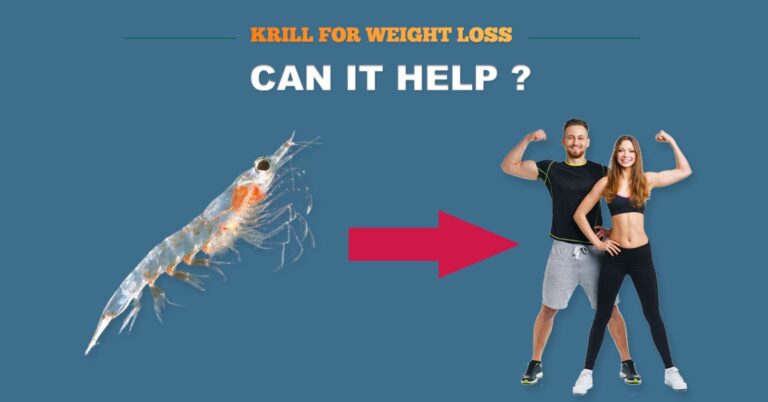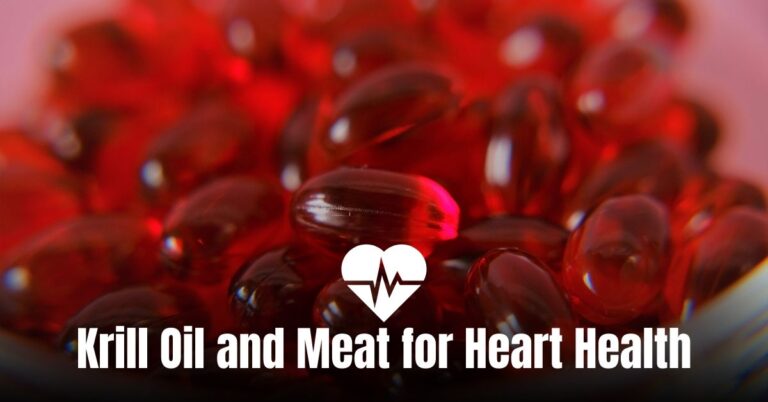Finding healthy, satisfying meals can be challenging in a world filled with fast food and convenience options. If you’re looking for dishes that are both delicious and nutritious, you’re in the right place. High protein, low fat meals offer a perfect balance for those aiming to build muscle, lose weight, or simply eat healthier.
Protein is essential for muscle repair and recovery while keeping fat intake low helps manage calories without sacrificing flavor.
These meals not only keep you full longer, reducing unnecessary snacking, but they also provide the energy needed to stay active and focused throughout the day. In this guide, you’ll find a curated list of simple, tasty, and nutrient-dense recipes that are easy to prepare and ideal for anyone looking to eat well without spending hours in the kitchen.
Whether you’re a fitness enthusiast or just looking to clean up your diet, these recipes will help you achieve your health goals while still enjoying every bite.
Let’s dive into ten high-protein, low-fat recipes that will quickly become your go-to meals.
Why High Protein Low Fat Meals Matter
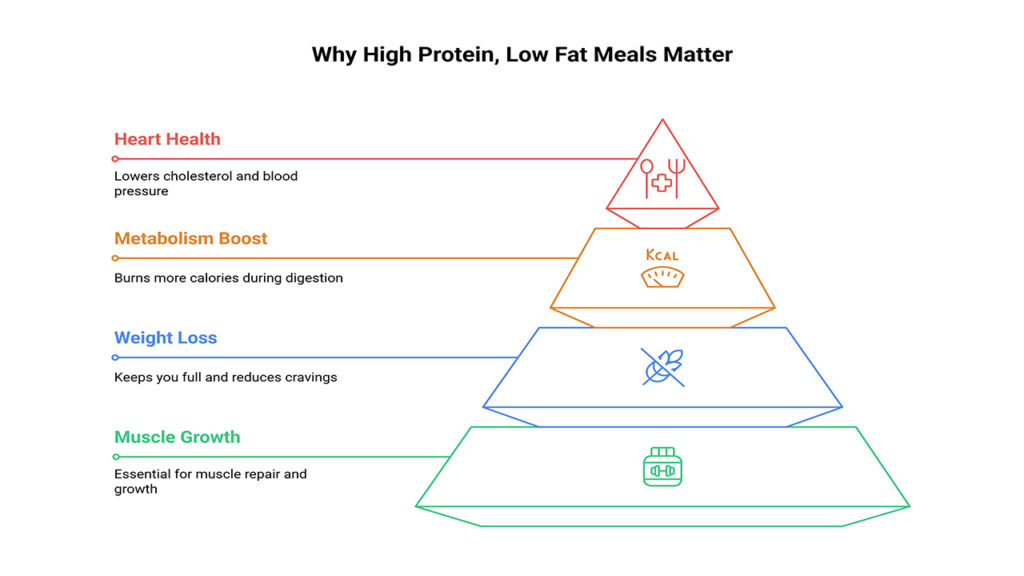
Supports Lean Muscle Growth
Protein plays a vital role in muscle repair and growth, making it an essential nutrient for anyone who exercises regularly or leads an active lifestyle. Consuming high-protein meals helps the body recover faster after workouts, supports muscle maintenance, and promotes strength. By pairing protein with low-fat ingredients, you can fuel muscle growth without adding unnecessary calories or unhealthy fats.
Effective for Weight Loss
One of the biggest challenges in weight loss is managing hunger and cravings. High protein, low fat meals are highly effective in keeping you full for longer periods. Protein increases satiety by slowing down digestion and reducing the urge to snack throughout the day. By keeping fat content low, these meals help you cut excess calories while still enjoying satisfying, flavorful dishes, making it easier to achieve a calorie deficit.
Boosts Metabolism & Maintains Energy
Protein requires more energy to digest than carbohydrates or fats, which means your body burns more calories during the digestion process. This thermic effect can give your metabolism a slight boost, supporting weight management efforts. Low-fat meals, on the other hand, provide the nutrients you need without the heaviness, leaving you feeling energized and alert rather than sluggish.
Heart Health & Overall Wellness
Cutting down on unhealthy fats is not only beneficial for your waistline but also crucial for heart health. High protein, low fat meals can help lower cholesterol levels and reduce blood pressure, promoting a healthier cardiovascular system. By focusing on lean proteins and nutrient-rich ingredients, you can support overall wellness while enjoying tasty and nutritious meals.
10 Best High Protein Low Fat Meals: Quick and Easy Recipes
Let’s dive into ten recipes that are not only high in protein and low in fat but also quick and easy to prepare. Whether you’re looking for a light dinner, a hearty breakfast, or a nutritious lunch, these recipes will help you stay on track with your health goals.
High Protein, Low Fat Breakfast Options
Egg White & Vegetable Omelet
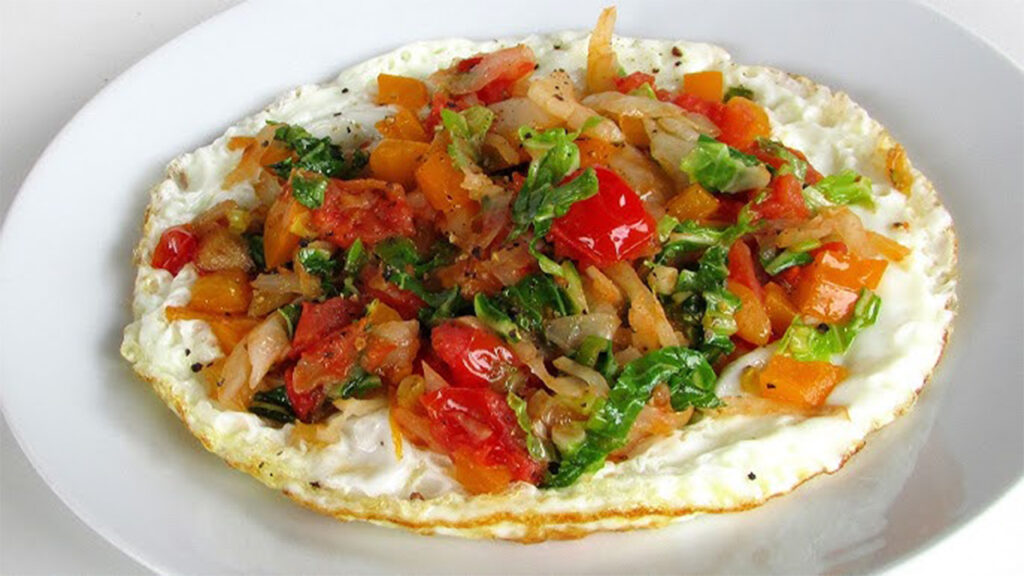
- Ingredients:
You’ll need 4 egg whites, a handful of sliced mushrooms, a handful of chopped spinach, 1/4 cup cherry tomatoes (halved), salt, and pepper. - Preparation:
Whisk the egg whites with salt and pepper. In a non-stick pan, sauté the mushrooms, spinach, and tomatoes until they soften. Pour the egg whites over the vegetables and cook until set. Fold the omelet in half and serve immediately for a quick, nutritious breakfast.
Greek Yogurt & Berry Parfait
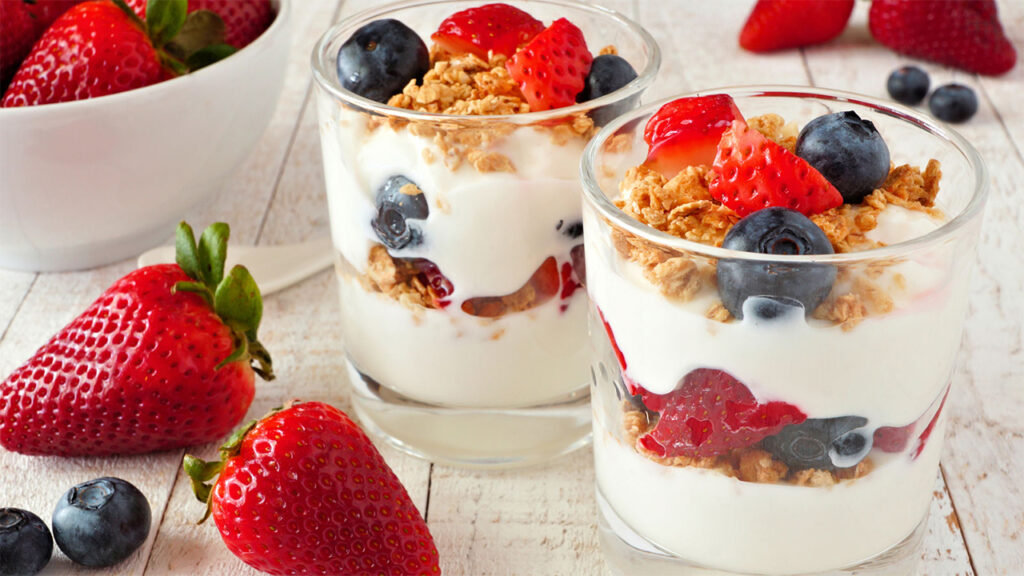
- Ingredients:
Gather 1 cup of unsweetened Greek yogurt, 1/2 cup of mixed berries (like strawberries and blueberries), 2 tablespoons of chopped nuts, and 1 tablespoon of honey (optional). - Preparation:
In a bowl or glass, layer the Greek yogurt with the mixed berries and nuts. Drizzle with honey if you like it sweeter. This parfait makes a perfect high-protein breakfast or light dessert.
Protein-Packed Overnight Oats
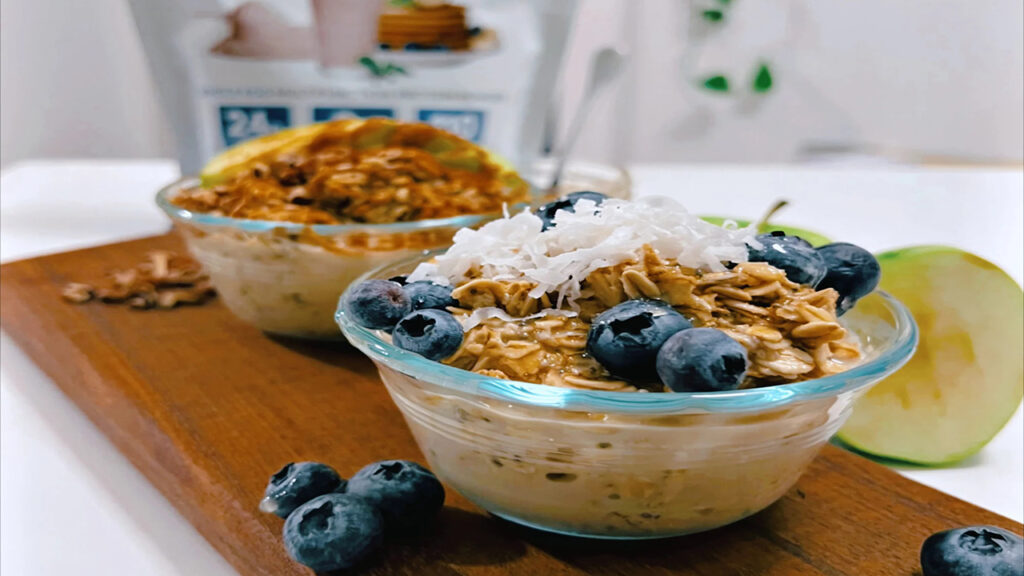
- Ingredients:
You’ll need 1/2 cup of rolled oats, 1 cup of unsweetened almond milk, 2 tablespoons of protein powder, a handful of berries, and 1 tablespoon of chia seeds. - Preparation:
Mix the oats, almond milk, protein powder, and berries in a jar. Let it sit overnight in the fridge. In the morning, top with chia seeds and enjoy a ready-to-eat, protein-rich breakfast.
High Protein Low Fat Lunch Options
Lemon Herb Grilled Chicken Salad
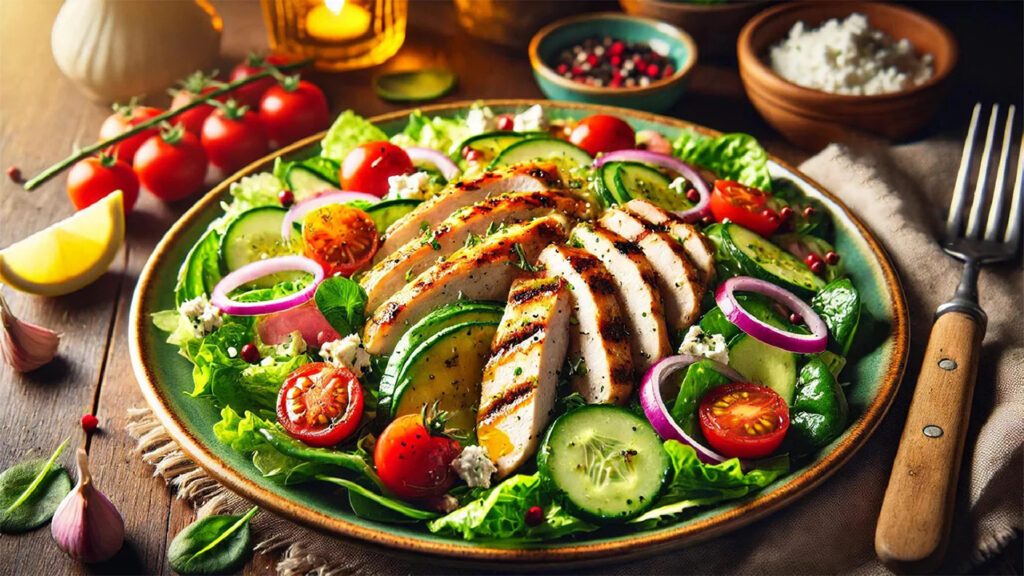
- Ingredients:
You’ll need 2 boneless, skinless chicken breasts, 2 tablespoons olive oil, juice of 1 lemon, 2 minced garlic cloves, 1 teaspoon dried oregano, mixed greens, cherry tomatoes, and cucumbers. - Preparation:
Marinate the chicken with olive oil, lemon juice, garlic, and oregano for at least 30 minutes. Grill for 6-7 minutes per side until fully cooked. Slice and serve over mixed greens with tomatoes and cucumbers, drizzling with balsamic vinegar if desired.
Turkey & Spinach Stuffed Bell Peppers
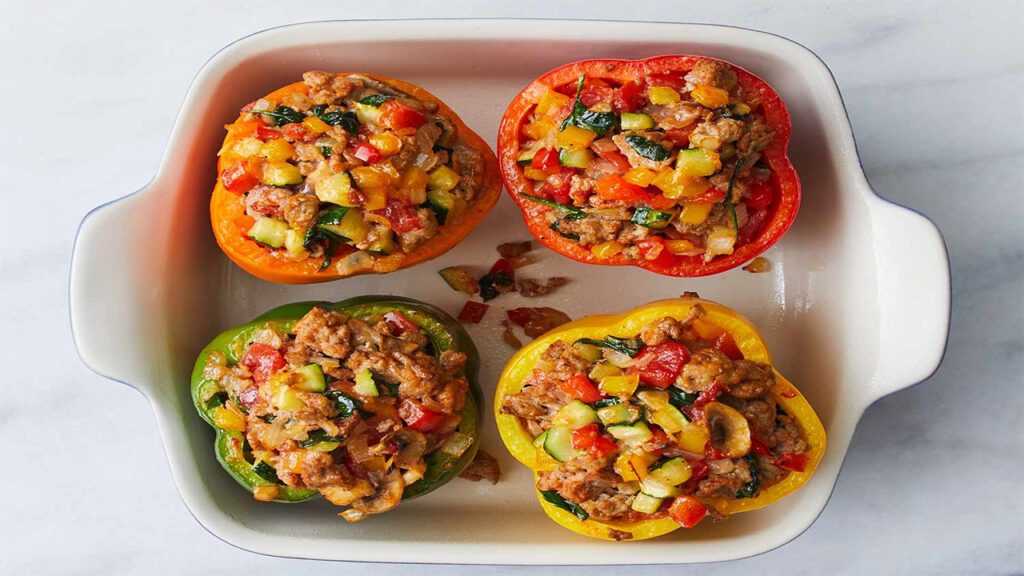
- Ingredients:
Gather 4 bell peppers, 1 pound of lean ground turkey, 1 cup of chopped spinach, 1/2 cup shredded low-fat cheese, 1 teaspoon of Italian seasoning, salt, and pepper. - Preparation:
Preheat your oven to 400°F (200°C). Cook the ground turkey with spinach, Italian seasoning, salt, and pepper. Stuff the turkey mixture into hollowed bell peppers, sprinkle with cheese and bake for 20-25 minutes until the peppers are tender.
Spicy Tofu Stir-Fry
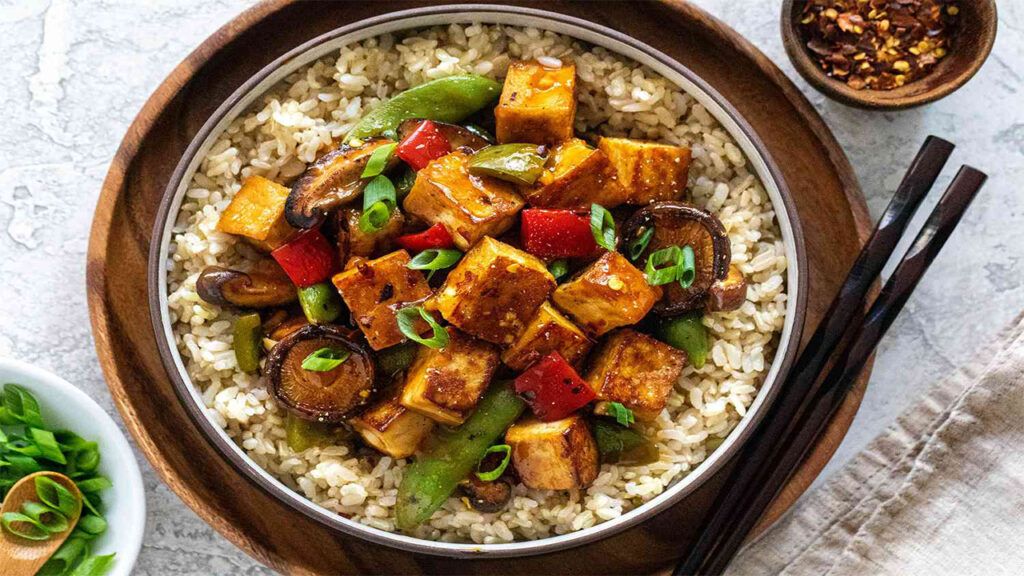
- Ingredients:
You’ll need 1 block of firm tofu (cubed), 1 tablespoon soy sauce, 1 teaspoon chili paste, 1 red bell pepper (sliced), 1 cup broccoli florets, and 2 tablespoons vegetable broth. - Preparation:
Sauté the cubed tofu in a non-stick pan until golden. Add the bell pepper, broccoli, soy sauce and chili paste. Stir-fry for 5-7 minutes until the veggies are tender but still crisp. Serve over brown rice for a filling, plant-based lunch.
Lentil & Chickpea Stew
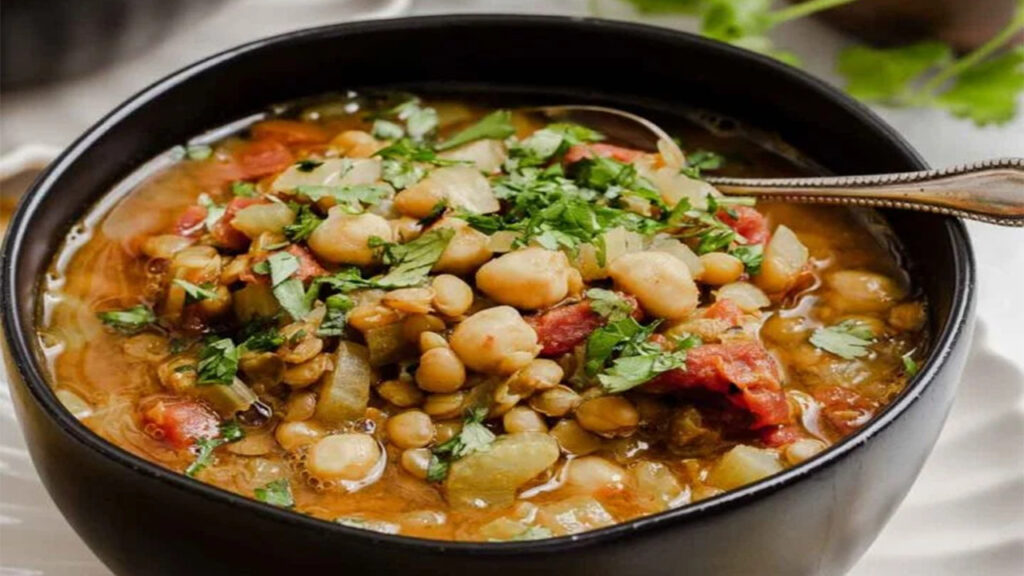
- Ingredients:
Gather 1 cup lentils, 1 can (15 oz) chickpeas (drained), 1 onion (chopped), 2 garlic cloves (minced), 1 teaspoon cumin, and 4 cups vegetable broth. - Preparation:
Sauté the onion and garlic until soft. Add lentils, chickpeas, cumin, and vegetable broth. Simmer for 25-30 minutes until the lentils are tender. This stew is hearty and perfect for meal prep.
Shrimp & Zucchini Noodles
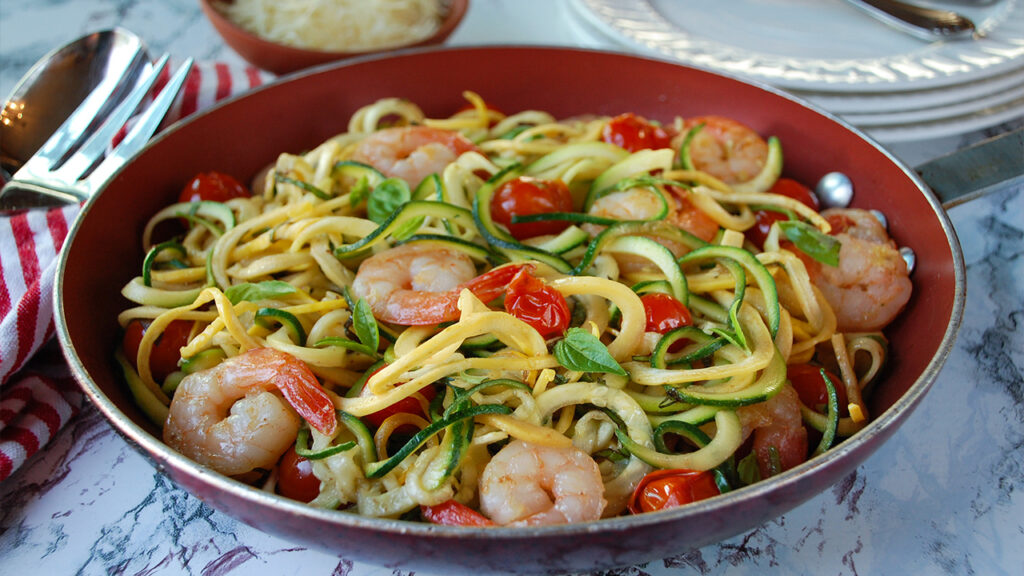
- Ingredients:
You’ll need 1 pound shrimp (peeled and deveined), 2 zucchinis (spiralized), 2 tablespoons olive oil, 2 garlic cloves (minced), and juice of 1 lemon. - Preparation:
Sauté the shrimp with garlic in olive oil until they turn pink. Add the zucchini noodles and cook for another 2-3 minutes. Finish with a squeeze of lemon juice for a refreshing, low-carb lunch.
Air-Fried Salmon & Asparagus
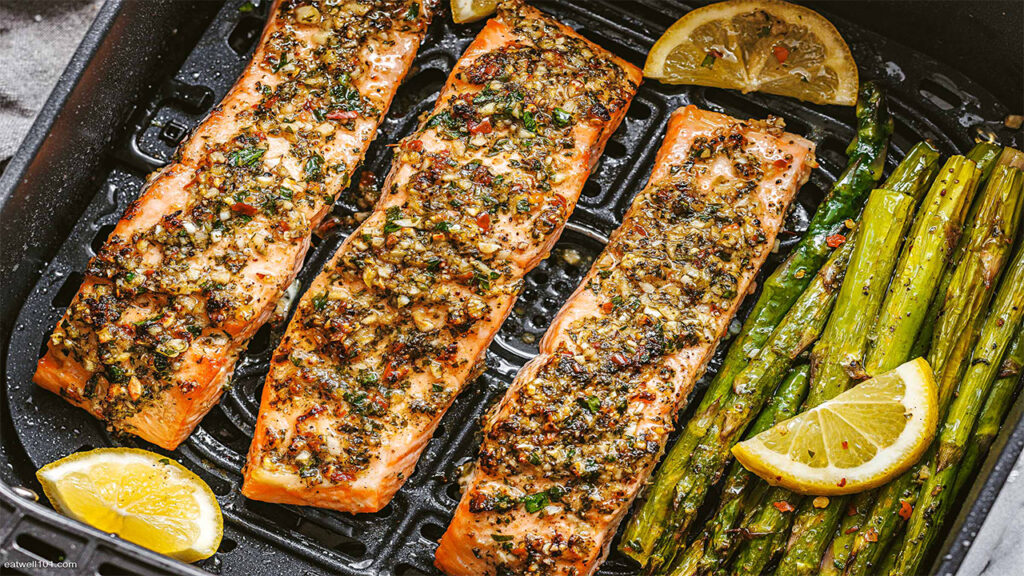
- Ingredients:
You’ll need 2 salmon fillets, 1 bunch asparagus, 2 tablespoons olive oil, 1 teaspoon garlic powder, salt, and pepper. - Preparation:
Preheat the air fryer to 400°F (200°C). Coat the salmon and asparagus with olive oil, garlic powder, salt, and pepper. Cook in the air fryer for 10-12 minutes until the salmon is cooked through. Serve with a side of brown rice.
Grilled Tempeh Salad with Avocado Dressing
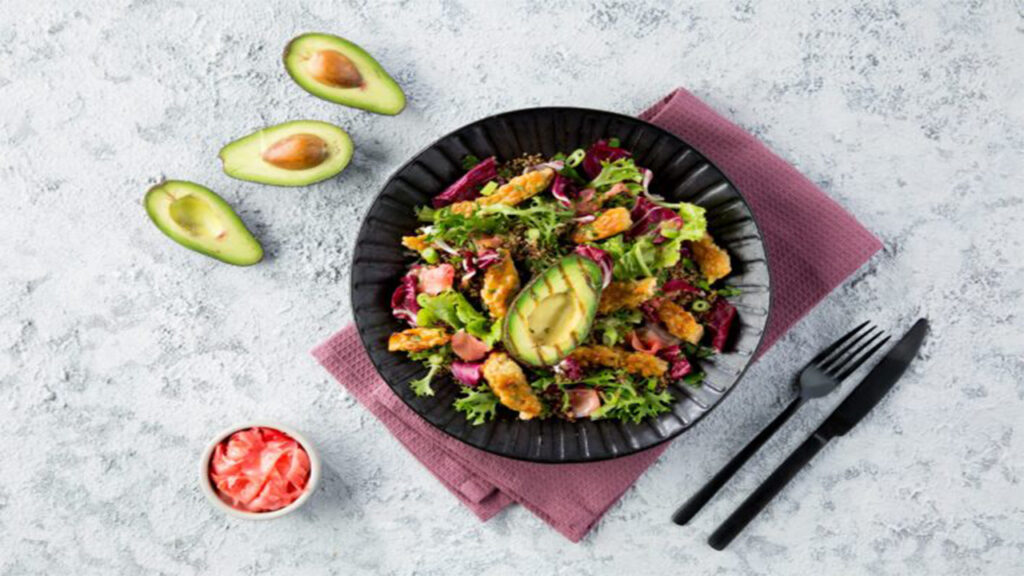
- Ingredients:
Gather 1 block of tempeh, 4 cups mixed greens, 1 avocado, 2 tablespoons olive oil, juice of 1 lime, salt, and pepper. - Preparation:
Grill the tempeh slices until charred. For the dressing, blend the avocado, olive oil, lime juice, salt, and pepper until smooth. Toss mixed greens with grilled tempeh and drizzle with the creamy avocado dressing.
Expert Tips for Creating High Protein Low Fat Meals
Crafting high-protein, low-fat meals is all about choosing lean proteins and using smart cooking techniques. By focusing on ingredients like chicken, fish, tofu, and veggies, you can create tasty dishes that support a healthy lifestyle. These simple yet flavorful recipes will help you enjoy nutritious meals without sacrificing taste.
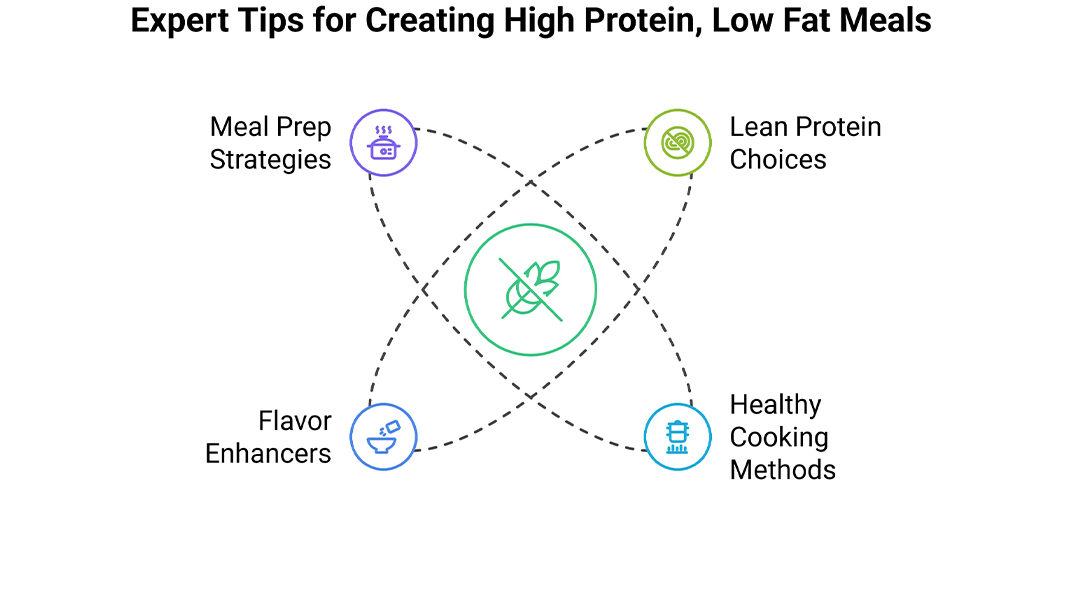
Focus on Lean Proteins
- Top Choices: Select lean proteins like chicken breast, white fish (cod, tilapia), tofu, tempeh, and legumes (lentils, chickpeas) for high protein without excess fat.
- Why It Matters: These proteins are nutrient-dense and promote muscle repair while keeping fat intake low.
- Pro Tip: Always remove the skin from poultry and trim visible fat from meat to reduce overall fat content.
Choose Healthy Cooking Methods
- Best Techniques: Grilling, air-frying, steaming, and baking help preserve nutrients and add flavor without unnecessary oils.
- Grilling: Adds a smoky taste while keeping food light.
- Air-Frying: Achieves a crispy texture with minimal oil.
- Steaming: Locks in moisture and nutrients, especially for veggies and fish.
- Baking: Ideal for proteins like fish and chicken; use parchment paper to avoid extra oil.
- Pro Tip: Marinate proteins with herbs, garlic, and lemon juice for added depth without the fat.
Spice It Up Without Extra Calories
- Flavor Enhancers: Herbs (basil, cilantro, rosemary), spices (cumin, paprika, turmeric), and acidic elements (lemon juice, vinegar) can boost flavor naturally.
- Why It’s Important: These add richness to dishes without resorting to creamy or oily sauces.
- Pro Tip: Dry-roast spices briefly in a pan before using to intensify their aroma and flavor.
Embrace Batch Cooking & Meal Prep
- Why Meal Prep Works: Saves time, ensures portion control, and helps you stick to healthy eating throughout the week.
- Plan Ahead: Choose recipes that share ingredients to streamline grocery shopping and cooking.
- Prep Smart: Pre-chop veggies, cook grains, and marinate proteins in bulk.
- Pro Tip: Store prepped ingredients in airtight containers to keep them fresh and ready for quick meal assembly. Freeze soups or stews in single portions for longer shelf life.
Conclusion
Incorporating high-protein, low-fat meals into your diet is a simple yet effective way to support muscle growth, boost metabolism, and promote overall wellness. These recipes demonstrate that healthy eating doesn’t have to be bland or time-consuming. By focusing on lean proteins, fresh vegetables, and smart cooking techniques, you can create delicious, nutrient-packed meals that help you stay on track with your fitness and health goals.
Whether you’re aiming to lose weight, gain muscle, or simply eat cleaner, these easy-to-make dishes will keep you satisfied and energized. So, start experimenting with these recipes to enjoy flavorful meals that are as good for your body as they are for your taste buds.

